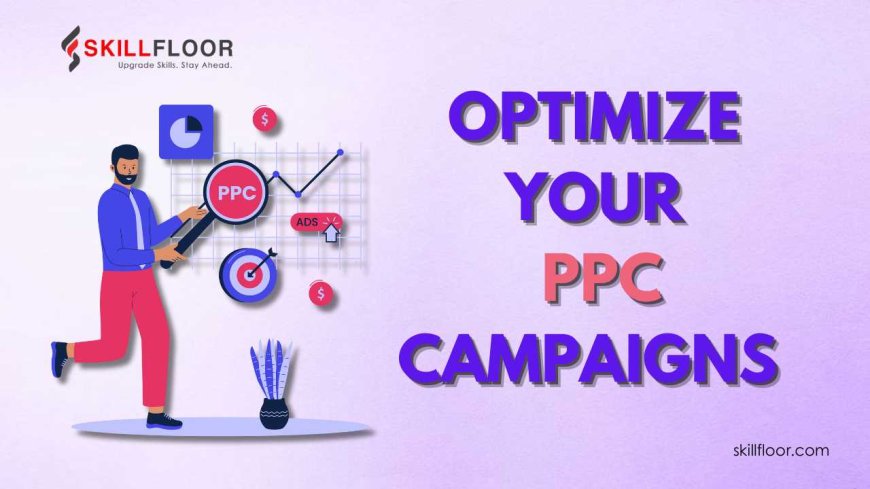How to Optimize Your PPC Campaigns Effectively
Learn how to optimize your PPC campaigns effectively with proven strategies to boost ROI, drive traffic, and increase conversions.

A vital part of digital marketing is pay-per-click (PPC) campaigns, which let companies run online advertisements that only cost money when a user clicks on them. Because of their flexibility, PPC campaigns are an essential strategy for quickly and efficiently directing targeted visitors to websites. Effective PPC campaign optimization requires careful consideration of several factors, including targeting choices, ad wording, and keyword selection. PPC campaigns are mostly dependent on ongoing optimization to maintain their cost-effectiveness and meet the intended marketing objectives. You may raise the possibility that your target audience will see your PPC ads and increase the overall return on investment of your digital marketing endeavors by making them more efficient. We'll look at effective PPC campaign optimization strategies to make sure you receive the most value for your money. We'll take care of everything, from defining specific goals to polishing the language of your advertisement. Let's get started and learn how to optimize your PPC campaigns effectively so that each click counts!
Understanding PPC Campaigns Basics
Pay-Per-Click, or PPC is an online marketing strategy in which advertisers are charged a fee each time one of their ads is clicked. In essence, you're purchasing visitors to your website as opposed to obtaining them naturally.
PPC advertising is available on websites like Google Ads, and Bing Ads, and social media networks like Facebook and LinkedIn. PPC advertising is highly precise due to its ability to target particular keywords, demographics, and behaviors. This allows you to make sure that your ads are seen by the correct people at the appropriate time. But a firm grasp of the fundamentals is necessary to profit from these advantages.
Setting Clear Campaign Objectives
Every effective PPC campaign begins with goals that are precise and well-defined. These goals should be SMART (specific, measurable, achievable, relevant, and time-bound) and should be in line with your overall business objectives. Are you trying to raise sales, improve website traffic, or raise brand awareness? Understanding your objectives will enable you to modify your plan and efficiently gauge your progress.
For example, if you want to increase traffic to a new product page, you could concentrate on product-related keywords and create advertisements that showcase its special qualities. If your goal is to boost sales, you may want to focus on high-intent keywords and employ enticing promotions to draw in customers.
Keyword Research and Selection
The basis of any PPC campaign is its keywords. Your PPC campaign's success or failure depends on the keywords you choose. To find out what terms your potential consumers are searching for, conduct in-depth keyword research first. Finding high-volume, low-competition keywords is made much easier with the help of tools like Ahrefs, SEMrush, and Google Keyword Planner.
When choosing keywords, consider the intent of the user. Do they want more information, or are they prepared to buy something? Because they capture more particular search intent, long-tail keywords (phrases with three or more words) frequently have lower competition and higher conversion rates. As an illustration, rather than placing a bid on the general keyword "shoes," think about "women's running shoes size 8."
Optimizing Ad Copy and Creatives
Make the most of your first impression with the copy and creativity of your advertisement! PPC campaigns that work are appealing, apparent, and customized for your intended demographic. In addition to highlighting the advantages of your product or service, they also need to have a compelling call-to-action (CTA) that compels visitors to click.
Ad copy optimization:
Make use of your main keywords: Optimize the ad text by naturally incorporating your primary keywords to increase click-through rates (CTR) and relevancy.
Emphasize your USPs (unique selling points): What distinguishes your offer? Make sure it's clearly shown, whether it's a time-limited sale, free shipping, or superior quality.
Try various iterations: To determine which headlines, descriptions, and calls to action (CTAs) your audience responds to the best, conduct A/B tests.
Make sure the images are of excellent quality and related to the topic of your advertisement. This can have a big effect on how well your advertisement performs on sites like Facebook or Instagram, where visual appeal is important.
Leveraging Targeting Options
One of PPC campaigns's greatest benefits is their ability to precisely define particular audiences. To limit who sees your ads based on geography, interests, behaviors, and demographics, use targeting settings. By doing this, you can be sure that your advertisements are seen by the people who will be most likely to convert.
For example, geo-targeting enables you to show advertisements exclusively to users inside your service region if you're selling a local service. Alternatively, you might modify your targeting if a particular age group finds your offering attractive. Try out various targeting combinations to determine which ones are most effective for your PPC campaigns.
Managing Budgets and Bids
Effective budget management is essential to the success of a PPC campaign success. Establish a daily or monthly spending plan that complements your overarching marketing plan and your company's objectives. Particularly if you're new to PPC, start with a small budget and progressively increase it as you start to see results.
Another important element is bid management. The amount you are willing to spend for each click on your ads is determined by your bids. Different bidding tactics are available on platforms such as Google Ads; these range from automated solutions such as target CPA (cost-per-acquisition) to manual CPC (cost-per-click). Select a plan that fits in with the goals of your PPC campaigns, and keep a close eye on your bids to prevent going over budget.
Utilizing Ad Extensions
You can include more information in your advertising, called ad extensions, such as location, phone numbers, or links to particular pages on your website. They increase the informational value of your advertising and have the potential to raise your CTR by making them more user-relevant and enticing.
Typical kinds of ad extensions consist of:
Sitelink Extensions: Send visitors to particular pages on your website, like the contact or product pages.
Call Extensions: Provide your phone number so that people may reach you directly by adding it to your advertising.
Location Extensions: Make it simpler for local clients to find you by displaying your business address.
Callout Extensions: Promote extra details about your company, like "Free Returns" or "24/7 Customer Service."
A combination of strategic planning, focused keyword selection, persuasive ad copy, and efficient budget management go into optimizing your PPC campaigns. You can improve the effectiveness of your PPC campaigns by using ad extensions, leveraging a variety of targeting choices, and setting clear objectives. Maintaining the effectiveness and cost-effectiveness of your advertisements is essential to bringing in vital traffic and conversions for your company. This requires constant monitoring and improvement.




























































